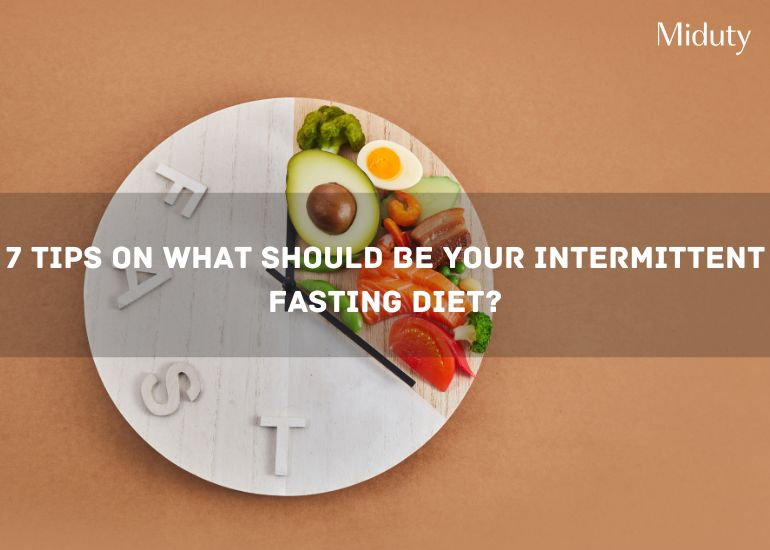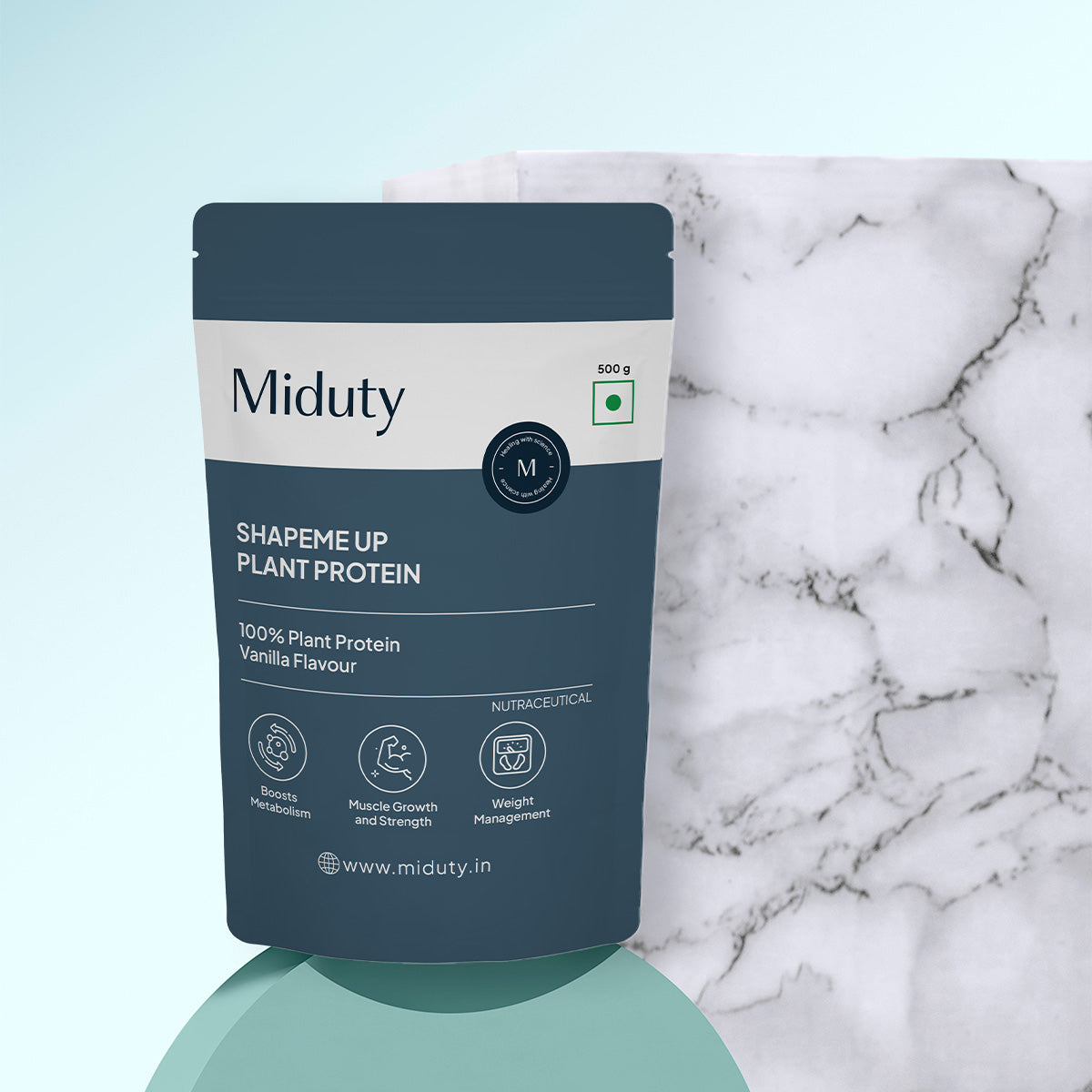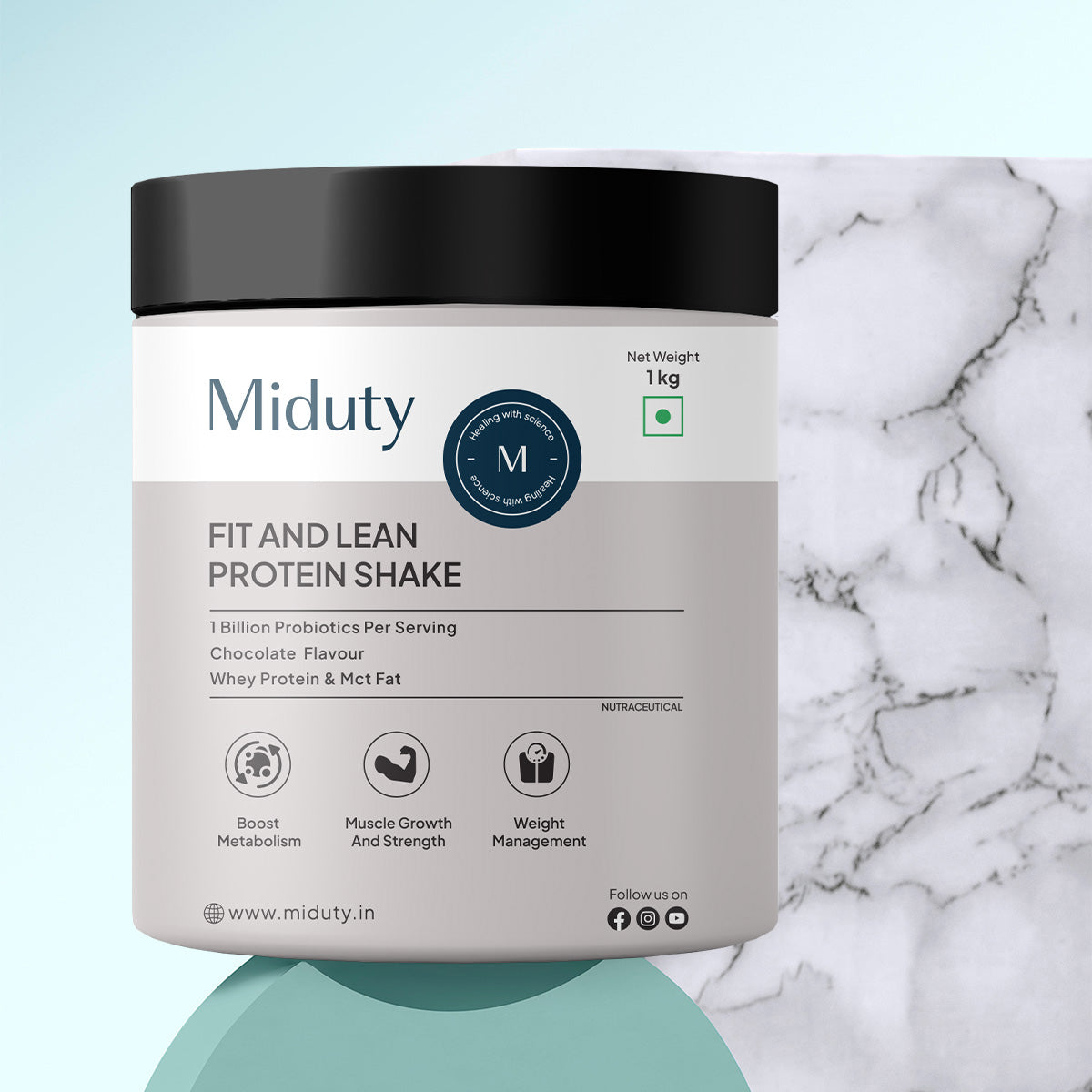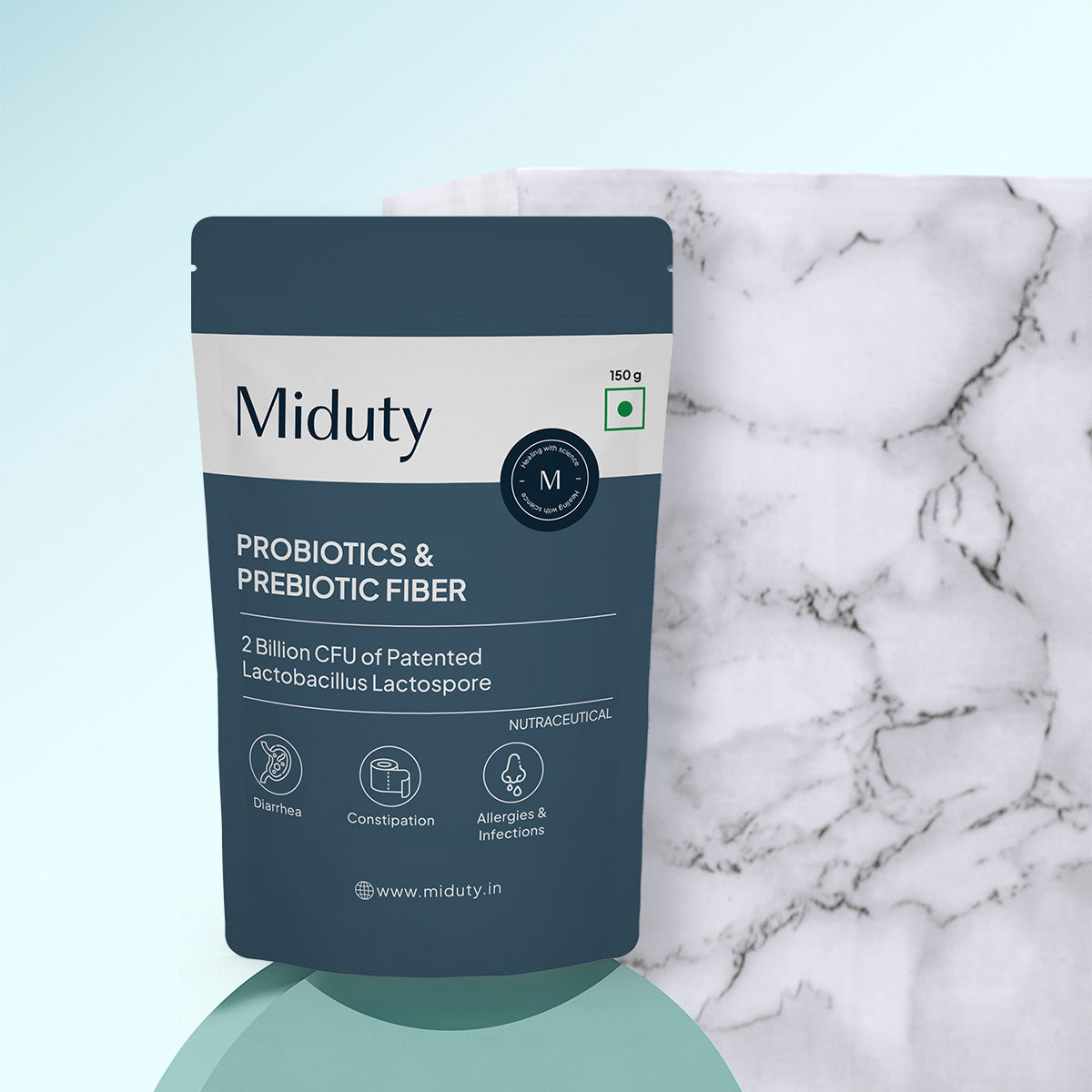
7 Tips on What Should be Your Intermittent Fasting Diet?
Key Takeaways
1. Nutrient-Dense Foods: Prioritize nutrient-rich foods like vegetables, lean proteins, and healthy fats during your eating window to maximize the nutritional benefits of intermittent fasting.
2. Balanced Macronutrients: Aim to balance proteins, fats, and carbohydrates in your meals to maintain energy levels and support overall health.
3. Hydration Matters: Staying hydrated is crucial; often, hunger pangs are signs of dehydration. Drink plenty of water, herbal teas, or electrolyte-rich beverages.
4. Meal Planning: Effective meal planning can help you make healthier choices and prevent impulse eating. Prep meals in advance and include a variety of foods for balanced nutrition.
5. Portion Control: Be mindful of portion sizes to avoid overeating, even with healthy foods. Listen to your body's hunger cues and use smaller plates to help manage portions.
6. Limit Processed Foods: Reduce intake of processed foods and added sugars, which can spike blood sugar levels. Opt for homemade meals to control ingredients and sugar content.
7. Include Healthy Fats: Consider adding Bulletproof coffee with MCT powder or ghee to your routine for sustained energy and cognitive support during fasting.
So, you've hopped on the intermittent fasting (IF) train—congratulations! Whether you're doing it for weight loss, better health, or just to feel more in control of your eating habits, IF can be a game-changer. Intermittent fasting isn't about skipping meals all day; it's about making the most of your eating window!
But here's the catch: fasting isn’t just about skipping meals; it’s about making the right choices when you do eat. Ever wondered why your results aren't matching your effort? The answer might be lurking on your plate.
You can't just feast on anything during your eating window and expect to hit your goals. What you eat matters as much as when you eat.
Want to boost energy, lose weight, and feel good during your fast? A strategic approach to your IF diet can make all the difference.
In this blog, we’re dishing out 7 must-know tips to optimize your intermittent fasting diet. From nutrient-packed meals to timing your carbs and proteins, these simple tweaks will help you level up your fasting game. Ready to fast smarter and eat like a pro? Let’s dive in!
7 Tips on What to Eat During Intermittent Fasting?

1. Focus on Nutrient-Dense Foods
When you're fasting intermittently, every meal counts, so it’s essential to choose foods that pack a punch in terms of nutrients. Nutrient-dense foods provide a high concentration of vitamins, minerals, and beneficial compounds while keeping calorie counts reasonable. When breaking your fast, it’s essential to start with a protein-rich meal to help preserve muscle mass and promote satiety.
Examples of nutrient-dense foods include:
- Vegetables: Leafy greens like spinach, kale, spinach mustard greens, as well as cruciferous vegetables such as broccoli and brussels sprouts.
- Lean Proteins: Chicken, greek yogurt, tofu, lentils, chickpeas, and legumes provide essential amino acids without excessive fat. [1] Protein is crucial during intermittent fasting as it helps preserve muscle mass, boosts metabolism, and promotes satiety, making it easier to stick to your fasting regimen and achieve your health goals.
- Healthy Fats:Avocados, nuts, seeds, and olive oil offer essential fatty acids that support brain function and hormone balance. Soaked seeds like chia, flax, pumpkin, sunflower, and sesame are excellent for intermittent fasting due to their high nutrient content.
Soaking these seeds enhances their digestibility and nutrient absorption, making them a perfect addition to your meals for sustained energy and satiety.
By focusing on these foods, you ensure that your body gets the nutrients it needs, even within a limited eating window.
2. Incorporate Balanced Macronutrients
To sustain energy levels and maintain overall health, it’s vital to balance macronutrients—proteins, fats, and carbohydrates—during your eating periods. Each macronutrient plays a specific role in your diet.
Here’s how to balance them:
- Proteins: Incorporate lean protein sources at every meal. Proteins are essential for muscle repair, boosting metabolism, and maintaining satiety.
- Fats: Healthy fats are crucial for long-lasting energy and overall wellness. Include sources like avocados, soaked nuts, and seeds in your diet.
- Slow-Digesting Carbohydrates: Choose slow-digesting carbohydrates such as vegetables and legumes. They provide steady energy without causing spikes in blood sugar levels. [2] Balancing these macronutrients helps ensure you stay satisfied and nourished throughout your fasting periods.
3. Stay Hydrated
Hydration is a cornerstone of effective intermittent fasting. Often, feelings of hunger are signs of dehydration. Staying well-hydrated can help manage hunger and improve overall health.
Tips for staying hydrated:
- Drink Water: Aim for at least 8 glasses of water daily. Add a splash of lemon or cucumber for variety.
- Herbal Teas: Unsweetened herbal teas can offer a soothing, calorie-free way to stay hydrated.
- Electrolytes: For extended fasts, consider replenishing electrolytes with coconut water or a pinch of salt in your water.
Proper hydration supports metabolic processes, aids in digestion, and helps control hunger. [3]
4. Plan Balanced Meals
Effective meal planning ensures you make the most of your eating windows and avoid unhealthy choices.
Strategies for meal planning:
- Create a Meal Schedule: Plan meals and snacks to ensure they’re balanced and nutrient-dense.
- Prep Ahead: Prepare ingredients or full meals in advance to streamline your eating windows.
- Include Variety: Incorporate a diverse range of foods to cover different nutrient needs and keep your diet exciting.
Planning your meals can help you stay on track and make healthier choices more consistently. You can also download the free intermittent fasting diet plan here.
5. Watch Portion Sizes
Even with healthy foods, portion control is crucial. Overeating can undermine the benefits of intermittent fasting and affect your progress.
Tips for managing portion sizes:
- Use Smaller Plates: Smaller plates can help you control portions and prevent overeating.
- Listen to Your Body: Eat until you’re satisfied, not stuffed. Pay attention to hunger cues and stop eating when you’ve had enough.
- Check Portions: Use measuring cups or a food scale to ensure you’re consuming appropriate portions, especially for calorie-dense foods like nuts and oils.
Being mindful of portion sizes helps maintain a calorie balance and supports your health goals.
6. Limit Processed Foods and Added Sugars
Processed foods and added sugars can derail your intermittent fasting efforts by causing blood sugar spikes and offering little nutritional benefit.
Avoid or limit:
- Sugary Beverages: Sodas, sweetened coffee, and energy drinks can quickly increase calorie intake and disrupt your fasting benefits.
- Refined Snacks: Foods like cookies, chips, and pastries are often high in unhealthy fats, sugars, and sodium.
To satisfy your cravings without resorting to sugary processed foods, consider healthier alternatives like dark chocolate (70% cocoa or higher), and unsweetened nuts or seeds. Greek yogurt with a drizzle of honey or homemade baked goods using whole ingredients can also provide a sweet fix without excess sugar. Creating smoothies with vegetables and fruits offers a nutritious, refreshing option.
Additionally, cooking your favorite meals at home instead of relying on takeaway foods allows you to control ingredients and sugar content, promoting healthier eating habits while saving money. [4]
7. Bulletproof Coffee
Bulletproof coffee is a popular drink that combines freshly brewed coffee with healthy fats like ghee, butter or MCT powder, creating a creamy, energizing beverage. Adding MCT powder or ghee is crucial because these healthy fats provide a quick source of energy, helping to enhance cognitive function and support fat metabolism.
The inclusion of MCTs (medium-chain triglycerides) promotes sustained energy without causing blood sugar spikes, making bulletproof coffee an ideal choice for those practicing intermittent fasting or looking to boost their mental clarity throughout the day.
What is the Best Supplement For Intermittent Fasting?
When it comes to enhancing intermittent fasting, protein is essential for preserving muscle mass and promoting satiety. One of the best supplements to consider is a high-quality protein shake that contains Probiotics and MCT Fats.
Conclusion
Mastering intermittent fasting involves more than just timing your meals; it requires a thoughtful approach to what you eat. By focusing on nutrient-dense foods, balancing macronutrients, staying hydrated, planning meals, managing portion sizes, avoiding processed foods, and including fiber-rich options, you can optimize the benefits of intermittent fasting.
Listen to your body, make adjustments as needed, and consider consulting a healthcare provider or nutritionist to tailor your diet to your personal health goals. With these tips, you’re well on your way to achieving a healthier, more balanced lifestyle.
Frequently Asked Questions (FAQs) on Intermittent Fasting Diet
Q1 - Is it better to fast for 12 hours or 16 hours?
The choice between a 12-hour or 16-hour fast depends on your goals and how your body reacts; a 16-hour fast often offers more benefits, but a 12-hour fast is easier to start with.
Q2 - Can I exercise while fasting?
Yes, you can exercise while fasting. However, it's important to listen to your body and adjust your workout intensity as needed.
Q3 - Is it okay to drink coffee or tea during fasting periods?
Yes, you can usually drink black coffee or tea without adding any calories. However, avoid adding milk, sugar, or other sweeteners.
Q4 - What is the best time for intermittent fasting?
The best time for intermittent fasting depends on your lifestyle and preferences. Common schedules include the 16/8 method (fasting for 16 hours and eating within an 8-hour window) or the 14/10 method, allowing you to choose what fits best with your daily routine.
Q5 - Does intermittent fasting work without exercise?
Yes, intermittent fasting can be effective for weight loss and health improvement even without exercise, as it primarily focuses on meal timing and food choices. However, combining intermittent fasting with regular physical activity can enhance overall results and promote better health benefits.
References













